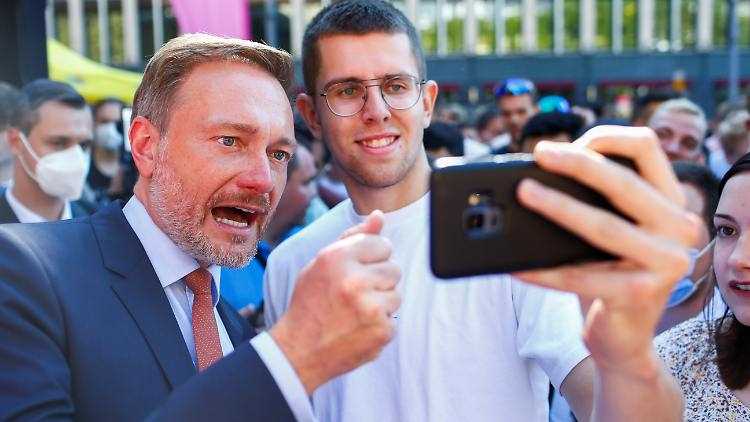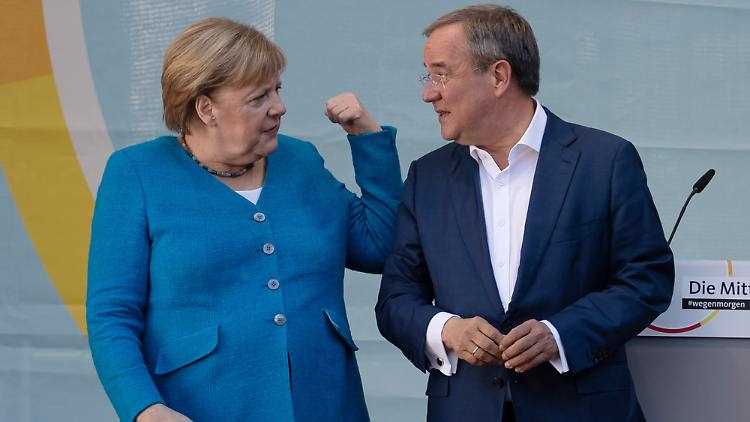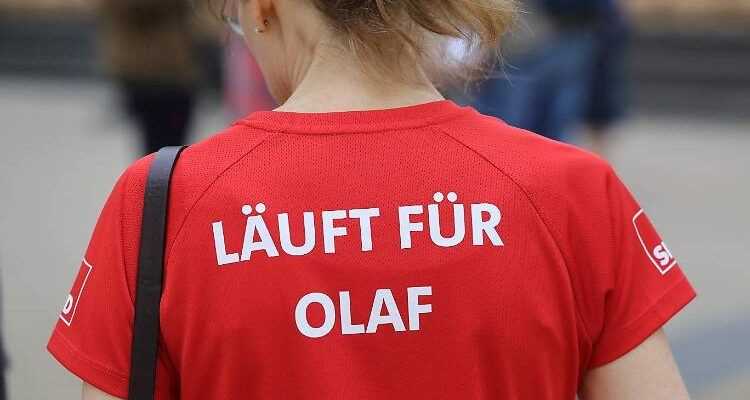Saturday, September 25, 2021
It’s on Sunday
Candidates make final statements from the coalition
The top candidates appear in public one last time before the election. SPD man Scholz announces that he prefers to govern with the Greens. But he could also do well with the FDP. In any case, Lindner wants to negotiate hard again. At the end of the day, CDU candidate Laschet relies on Merkel and stability.
During the last public appearances before the election, the candidates once again advertised themselves and their programs this Saturday. Chancellor Angela Merkel appeared together with Union Chancellor candidate Armin Laschet in his hometown Aachen and asked the voters for support. At the same time, Merkel and Laschet warned against the formation of a government outside the Union.
SPD candidate Scholz is the first to take part in the polls on election Sunday.
(Photo: imago images / Martin Müller)
SPD chancellor candidate Olaf Scholz reiterated his wish for a coalition with the Greens. “This is my favorite coalition,” said Scholz at his last meeting before the general election in his constituency in Potsdam. He appealed to the voters to use their vote to ensure that the SPD achieves a strong result. The Green Chancellor candidate Annalena Baerbock is also running as a direct candidate in the Potsdam constituency. In the latest polls, the SPD is ahead of the Union and the Greens.
In an interview with the editors of MediaPioneer, which Scholz also conducted in Potsdam on Saturday, the SPD candidate was reluctant to comment on the statement by SPD Vice Kevin Kühnert that the SPD should make a membership decision before forming a coalition. “We’ll decide that when it comes down to it,” said Scholz. Kühnert had recently indicated that the SPD would not join a new government without asking the members about forming a coalition.
In the interview, Scholz also emphasized his good relationship with FDP leader Christian Lindner. As a potential coalition partner, the FDP could play a decisive role in forming a government after the general election.
Lindner: SPD and Greens “wide open” for left-wing alliances

One last time in close contact with the voters: FDP boss Lindner warns of a left shift with a Chancellor Scholz.
(Photo: REUTERS)
One day before the election, FDP leader Lindner again announced a tough stance in possible negotiations on the formation of a government. Just as the FDP broke off talks on a Jamaica coalition with the Union and the Greens in 2017 because Germany had been sent “on a green-black drift to the left with marginal FDP participation”, this time too they would stand firm. “We are not ready to send our country on a left drift in 2021 either.” One is only ready for “a government in the middle” in which there will be no tax increases and no loosening of the debt brake.
Lindner took a critical stance on the SPD and the Greens, with whom the Liberals could possibly form a traffic light coalition after the election on Sunday. In his last appearance before the election, he assumed these two parties were “wide open” for a coalition with the left. In his one-hour speech, Lindner emphasized the plan to advance climate protection by reducing bureaucracy. Approval procedures urgently need to be accelerated so that industrial companies can implement CO2-reduction projects. Union candidate Laschet also spoke out in favor of faster approvals at his last appearance.
In her speech in Laschet’s home town of Aachen, Chancellor Merkel appealed to the citizens to prevent a government outside the Union. “Tomorrow it’s about Germany remaining stable,” said the Chancellor. “And it doesn’t matter who rules Germany.” That’s why she said: “Both votes for the CDU.” Against the background of the bad poll numbers for the Union, Merkel added: “And the second (vote) for Armin Laschet, so that Armin Laschet can become Federal Chancellor of the Federal Republic of Germany.”
Laschet: Cooperation with AfD excluded

Help from the predecessor: Chancellor Merkel spoke at the rally in Laschet’s hometown of Aachen.
(Photo: dpa)
Laschet, who thanked the Chancellor for the energetic support, warned in his last campaign speech against the participation of the left in a federal government. “We need a stable government,” said the CDU federal chairman. The left wants out of NATO and “another republic”. He predicts that “if there was a majority for red-red-green tomorrow, they will do it”. Therefore, the last few hours should be used to point out to everyone: “If you want stability in Germany, the CDU / CSU must be in first place tomorrow.”
At the same time, Laschet affirmed that the Union would not talk or cooperate with the AfD. “They have to disappear from parliaments everywhere in Germany, because they stir up resentment, because they turn people against each other.”
The Union and its candidate for Chancellor Laschet are under immense pressure before the election this Sunday. Merkel will no longer run after 16 years in office. In view of the large number of undecided voters, the outcome of the election is considered open. In the polls, the SPD was last able to maintain its leadership, but in some cases only very narrowly. Depending on the polling institute, it was 25 to 26 percent – and thus one to four percentage points ahead of the Union. The Greens with their candidate for Chancellor Annalena Baerbock are in third place in the polls.
Around 60.4 million citizens are called for the Bundestag election. It is expected that this time, as many as never before have cast their votes by postal vote – at least 40 percent. In parallel to the federal election, a new state parliament is elected in Mecklenburg-Western Pomerania and the House of Representatives in the state of Berlin.
